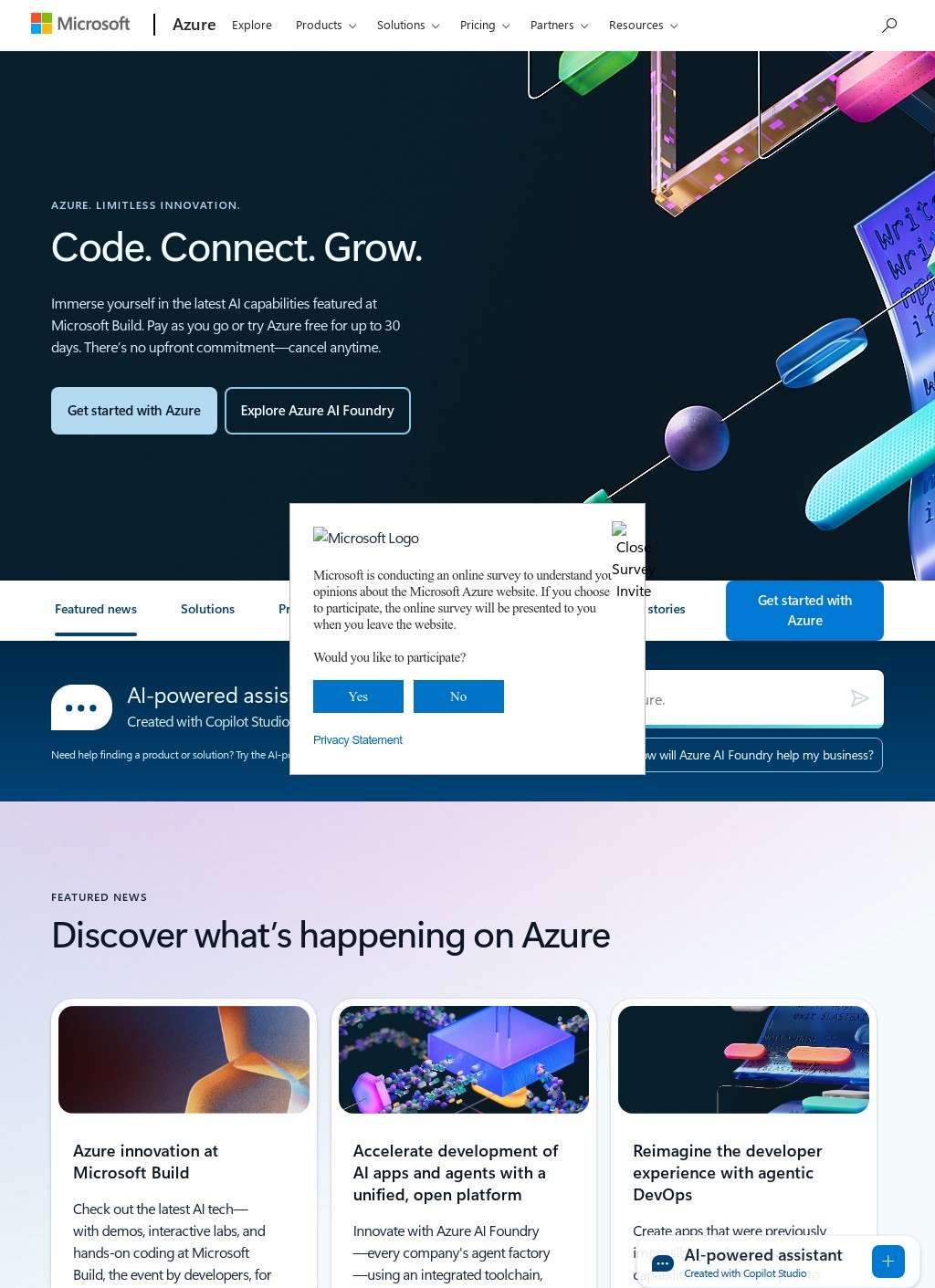Microsoft Azure represents Microsoft's comprehensive approach to cloud computing, designed specifically to bridge the gap between traditional enterprise IT environments and modern cloud-native applications. Launched initially as Windows Azure in 2010 and later rebranded to Microsoft Azure, the platform leverages Microsoft's decades of experience in enterprise software to provide seamless integration with existing Microsoft technologies while offering cutting-edge cloud services. Azure serves as both a migration path for organizations with existing Microsoft investments and a complete platform for new cloud-native development, making it particularly attractive to enterprises that have built their IT infrastructure around Microsoft technologies.
The platform's service catalog encompasses over 200 cloud services spanning infrastructure, platform, and software offerings. Core infrastructure services include Azure Virtual Machines for compute, Azure Storage for data persistence, and Azure Virtual Network for connectivity. Platform services feature Azure App Service for web application hosting, Azure Functions for serverless computing, and Azure Kubernetes Service for container orchestration. Software services include Office 365, Dynamics 365, and Azure Active Directory for identity management. This comprehensive portfolio allows organizations to adopt cloud services incrementally, starting with specific use cases and expanding over time without vendor lock-in concerns.
Azure's hybrid cloud capabilities set it apart from purely cloud-focused competitors by recognizing that most enterprises need to operate across both on-premises and cloud environments. Azure Arc extends Azure services and management to any infrastructure, whether in Azure data centers, on-premises, or even in other cloud providers. Azure Stack provides Azure services running on local hardware, enabling organizations to maintain data sovereignty while benefiting from cloud technologies. This hybrid approach acknowledges the reality of enterprise IT, where regulatory requirements, existing investments, and application dependencies often prevent complete cloud migration.
The platform's enterprise-grade security and compliance features address the stringent requirements of large organizations and regulated industries. Azure Security Center provides unified security management and threat protection across hybrid cloud workloads. Azure Active Directory offers identity and access management that integrates seamlessly with existing enterprise identity systems. The platform holds more industry compliance certifications than any other cloud provider, including specialized certifications for government, healthcare, and financial services. These capabilities enable organizations to move sensitive workloads to the cloud while maintaining compliance with industry regulations and internal security policies.
Integration with the broader Microsoft ecosystem creates unique value for organizations already invested in Microsoft technologies. Azure seamlessly connects with on-premises Active Directory, allowing for unified identity management across cloud and on-premises resources. Visual Studio and GitHub integration streamlines the development and deployment process for Microsoft-stack developers. Power Platform integration enables business users to create applications and automate processes using familiar Microsoft tools. This ecosystem approach reduces complexity and training requirements while maximizing the value of existing Microsoft investments.
Azure's artificial intelligence and machine learning capabilities position the platform at the forefront of enterprise AI adoption. Azure AI services provide pre-built APIs for common AI scenarios like computer vision, natural language processing, and speech recognition. Azure Machine Learning offers a complete platform for building, training, and deploying custom machine learning models. Azure Cognitive Services enables developers to add AI capabilities to applications without requiring specialized AI expertise. The platform also provides powerful data analytics services through Azure Synapse Analytics and Power BI, enabling organizations to extract insights from their data using integrated AI and machine learning tools.
Global infrastructure spans multiple geographic regions with a focus on data residency and low-latency access for users worldwide. Azure operates data centers in more regions than any other cloud provider, enabling organizations to place applications and data close to their users while complying with local data sovereignty requirements. Each region includes multiple availability zones for high availability and disaster recovery. Edge computing capabilities through Azure IoT Edge bring cloud intelligence to local devices, enabling real-time processing and decision-making in scenarios where connectivity to the cloud may be limited or latency-sensitive.
Support and professional services are tailored to enterprise needs, with multiple support tiers offering different response times and levels of technical assistance. Azure architects and solution specialists provide guidance on best practices, architecture design, and optimization strategies. Microsoft Learn offers comprehensive training resources and certification paths for Azure technologies. The Azure Marketplace provides access to thousands of certified applications and services from Microsoft and third-party vendors. Regular webinars, documentation updates, and community events ensure that customers stay current with new capabilities and best practices. For organizations requiring specialized assistance, Microsoft Consulting Services and certified partners provide implementation, migration, and optimization services tailored to specific industry requirements and business objectives.
